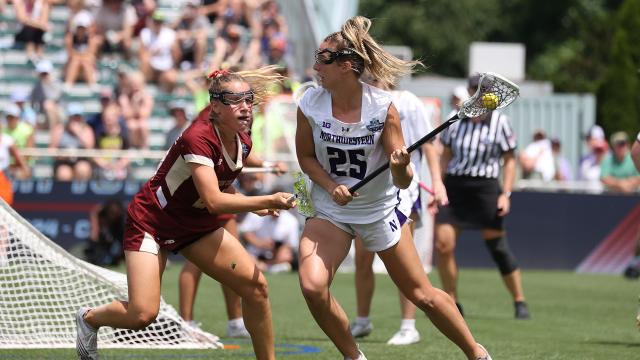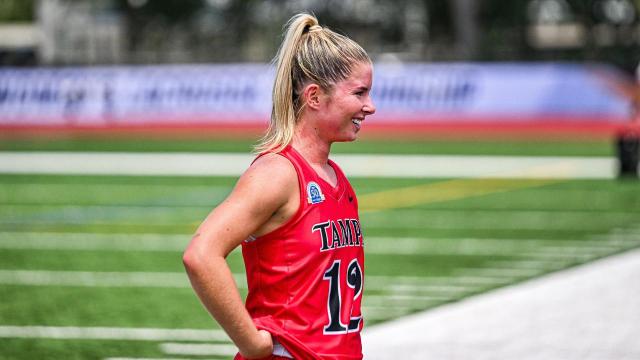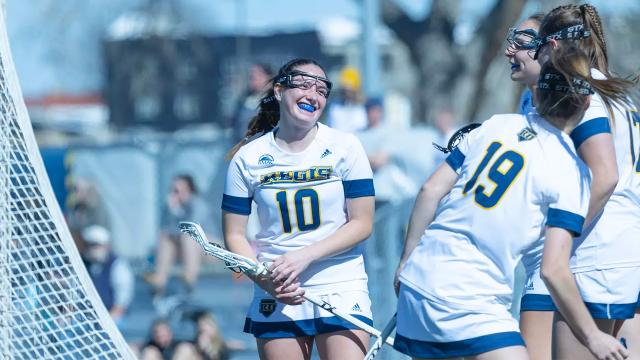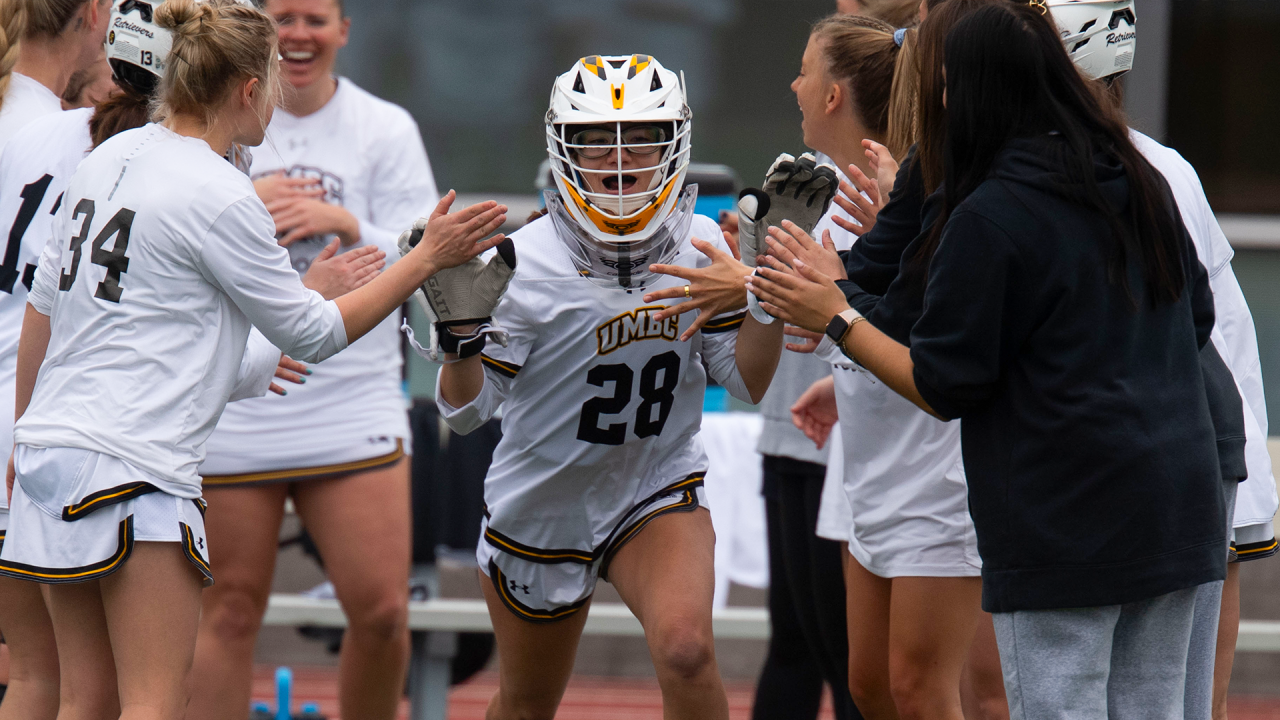
UMBC, Fontana Family Team Up to Raise Mental Health Awareness
This story contains discussion of mental health and suicide. If you or someone you love is in crisis, help is available 24/7/365.
Dial 988 for the Suicide and Crisis Lifeline or text “Home” to 741741 for the Crisis Text Line. Assistance is available in English and Spanish.
Isabella Fontana fell stick-over-cleats for lacrosse around the age of 6. Her high school coach at Academy of Holy Cross, former Johns Hopkins defender Katie Triplin (née Dumais), thought she had the chops to make it at the Division I level and was right. Isabella is in her second year as UMBC’s starting goalie — to no surprise of her parents, either.
“It’s frustrating during any sport or any kind of activity with her because you’re probably going to be on the losing end of it,” said Gabrielle Fontana, Isabella’s mother, with a laugh.
Loss is something the Fontana’s have experienced in an unimaginable way. Isabella’s younger sister, Mia, died by suicide in May 2021. The Fontanas started a foundation that bears her name, The Mia Fontana Foundation. Earlier in March, UMBC invited the family for a long weekend to spread a message about the importance of mental health.
It started with a text from UMBC head coach Amy Slade over the summer.
“As a parent myself, I was unsure how to break the ice and say, ‘Hey, we’re here to support you, and you have the foundation. How can we allow this legacy of your daughter to live on and help others?’” Slade said. “For us, it was diving into the pool being like, ‘We want to show you that we’re here to support you guys.’”
Slade has seen a groundswell of support for Morgan’s Message, a non-profit started in memory of former Duke player Morgan Rogers, who also died by suicide. Cancer Awareness games are also common — and important.
“I thought it’d be great, since [Isabella and her family] are a huge part of what we do, and mental health is something that we all struggle with, to also have something close to us as well,” Slade said.
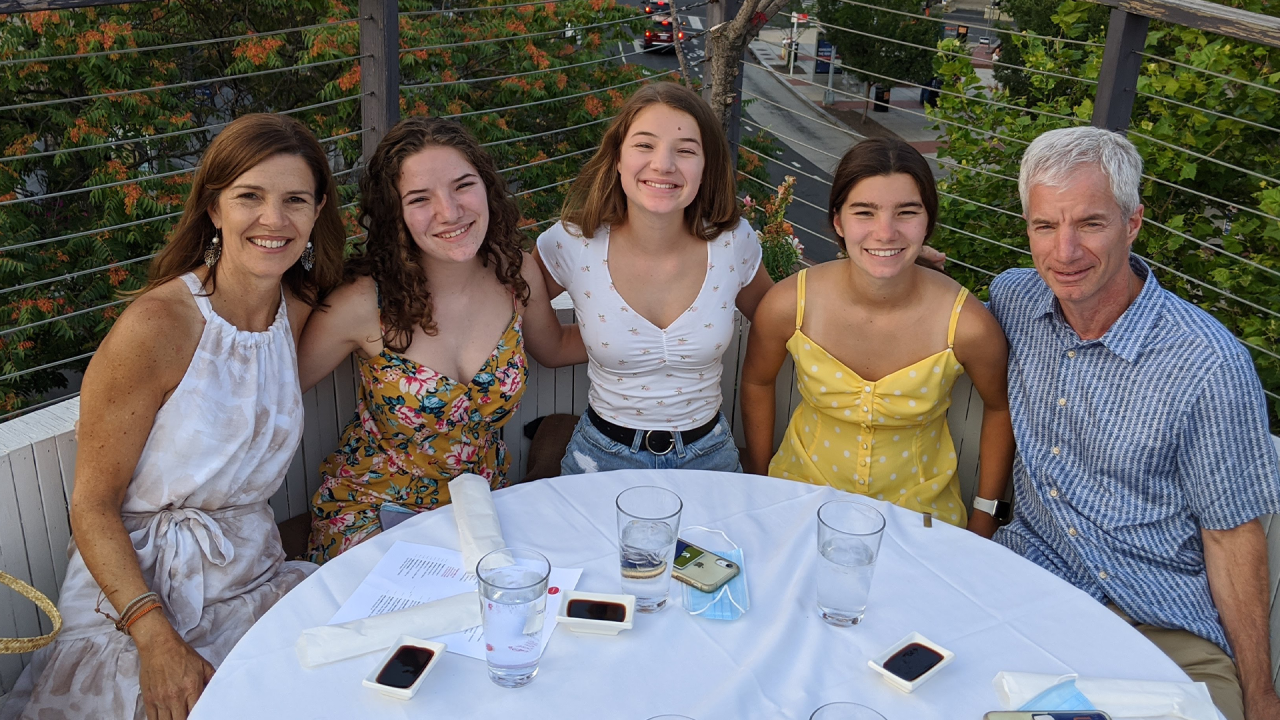
It was a way to pay it forward for Isabella, who had just finished her freshman season at UMBC when Mia passed. Now a captain, she’s someone who is always lifting others up, hearing them out and trying to help.
“She is everyone’s ear to listen,” Slade said. “She’s always been a really good listener with her teammates.”
Did losing a sister make Isabella a better listener? Maybe, but Slade said that she — and the Fontana family — are the same as they were when she met them during the recruiting process. They’re steady, humble and caring. Of course, grief and mental health conditions aren’t so simple to spot on the surface. Unlike a bruise or swollen leg, they can remain silent. And that’s something the Fontanas are trying to change.
Mental health conditions can also fester over long periods. In Mia’s case, the onset was sudden. In the Fontana family, each daughter has a character all her own. Isabella thrived on competition. Sofia was the analytical one. Mia? She was the social butterfly.
“She would walk up to a stranger and just start talking to them,” Gabrielle said. “I would say, ‘Did you know that person?’ ‘No, Mom, I didn’t know that person.’ She just gravitated toward people and could sit down and talk to anybody about anything. My mom had dementia. She would sit down and talk to her even if my mom was repeating the same story.”
That changed in 2020 when COVID-19 halted in-person learning, social events and even the ability to be within six feet of anyone you didn’t live with.
“The minute the pandemic started, when she went from not being able to see any friends … it went from 100 to zero in a week,” Gabrielle said.
She is everyone’s ear to listen. She’s always been a really good listener with her teammates.
UMBC coach Amy Slade on Isabella Fontana
It was only supposed to be a week. That week turned into two. Then, a month. Then, the rest of eighth grade for Mia. The Fontanas were concerned. The kid who thrived just walking to the school bus every morning preferred sleeping in — and constantly. They called her pediatrician.
“The pediatrician was like, ‘That’s kind of a sign of depression. Can you bring her in? I want to talk to her,” said Joe, Gabrielle’s husband and the father of Isabella, Mia and Sofia. “Gabrielle brought her, and she’s like, ‘Yeah, I think Mia is depressed. I think she should start seeing somebody.’ It felt like we went from happy-go-lucky Mia to having all these mental health challenges in a flash. We were just very surprised by the speed.”
The Fontanas got Mia help over Zoom. Ninth grade, which Mia was hopeful was in person, was also a remote ordeal. Isabella was insulated from some of it. She went off to UMBC, where she had to learn a new campus and defensive unit amid various pandemic-related rules. Like a goalie standing on her head, Isabella got into a zone, blocking the noise (but the body and mind keep score, too).
“I feel like you’re just in the flow,” Isabella said. “You’re just rolling with the punches until you step back and look at it. COVID, in general, also was different. During freshman year, we did things I hadn’t seen before in a college setting. But because I was away, I didn’t know anything was going on until I went home and heard about it. Since I was going back and forth, it was like, ‘Oh, this is stressful.’ But I just did it until it was like, ‘Oh wow, that actually happened.’”
Mia died on May 20, 2021.
The experience of losing a child to suicide can feel isolating and lonely. The Fontanas, unfortunately, are not alone. Suicide is the second-leading cause of death for people ages 5-24, according to Nationwide Children’s. In 2020 alone, more than 5,500 people in the age group died by suicide, according to a study published in Pediatrics. CDC data reports that 1 in 5 children ages 13-18 have a serious mental illness.
Quickly — within a week or two — the Fontana family was determined to curb these numbers by giving hope to the people behind them.
“We settled on starting a foundation, and we wanted to name it after her,” Joe said. “The whole thought behind the foundation is that we felt like sharing knowledge and awareness that, maybe if we had had that, we would have been able to help Mia a lot better.”
Even in the short time that Mia struggled, one thing compounded another — a ripple effect of sorts. Or, as Joe explains it, a snowball.
“If you picture mental health for children, as the snowball rolls down the hill, it gets larger and larger as time goes on,” Joe said. “The whole thought was that we wanted to get to people before the snowball started or maybe at the top and not progress down the hill. It’s not suicide prevention except for the fact that we want to reduce mental distress in children, which obviously would have that effect.”

Lacrosse has been a refuge for Isabella, whose UMBC coaches and teammates know how to read her cues and respond in a way that meets her needs as a human.
“I’m someone who always continues to have a smile on my face,” Isabella said. “I’m not somebody who’s overly friendly, giving everybody hugs 24/7, but [my teammates] are just there if I need to talk. They don’t overdo it or constantly ask me how I am, but they notice if something is off and check-in. And if I’m fine? I’m fine.”
It’s a culture Slade has tried to build at UMBC.
“The biggest thing to know is that not everyone is the same,” Slade said. “The tools that everyone is given are also not the same. As coaches, I truly believe that it’s our job to highlight how our student-athletes manage stress on whatever level that is.”
The foundation seeks to provide multiple tools, too, and Isabella is a big part of it. When she’s not stopping shots or focusing on her studies at UMBC — she hopes to start a sleepaway camp — she and Sofia help with “just the technical aspects” of the foundation. Isabella is being humble, her father says. She helps with design, like shirts and hats in different colors with bunnies and Mia’s name.
“I’m in the printing industry, and I don’t profess to be a designer, but Isabella just has this innate sense for design,” Joe said. “She hasn’t had any training in it or anything, but she understands what looks good.”
She also understands what will resonate with the youth part of the foundation’s target audience. That’s not to say that her parents aren’t hip, of course.
The foundation’s website provides resources like mental health and crisis hotlines. It also has discussion guides and toolkits from Angst, an anxiety education movie with interviews with kids, teens, experts and parents. A friend of Gabrielle’s suggested they watch it shortly after Mia’s passing, and the Mia Fontana Foundation hosts screenings of it at schools.
“One parent who is a school counselor reached out to me after attending the movie with her seventh-grade son,” Gabrielle said. “She said, ‘I have to tell you, with all the clinical training I’ve had, this was the most impactful night for my family.’ It’s hard to get me speechless, but she had me speechless. She told me that at that particular event, her son, who didn’t suffer from anxiety but has a sister who does, realized what his sister was going through. It’s made the family dynamics so much better. You get one of those at any event, and it’s a win.”
Gabrielle received numerous texts from UMBC student-athletes after the Fontana’s visit on campus. The initial plan was to screen Angst with the women’s lacrosse team, but they opened it to all athletes. Some came with their parents.
“She was receiving text messages from other student-athletes saying how great the presentation was and how they felt like they could understand better how to manage some of their situations,” Slade said.
It’s a message that Slade says is particularly important in athletics. While the stigma surrounding mental health is changing, there’s still pressure to be “strong” and “resilient” in sports. Slade wants people to know they can live in the “both and.”
“You can be strong. You can be resilient. You can be at the top of your game and still struggle,” Slade said.
Slade and Isabella find comfort in lacrosse but know others might feel differently. And? Isabella said the discussion serves as a reminder that even people who feel the same as she and Slade can benefit from other help if they’re struggling with mental health.
“Sometimes, athletics in college can consume your life more than you realize,” Isabella said. “Sometimes, people can get so wrapped up in [sports] and forget about themselves. Focusing on the fact that you’re not only defined by your sport is important.”
Two days after the screening, UMBC played Manhattan in its Mental Health for Children Day. The team wore T-shirts, and the foundation set up a booth with information on identifying stressors.
“We had a bunch of middle school teams that have attended our games come, and they were also able to be a part of that and kind of gain knowledge,” Slade said.
Then, the Retrievers had a game to play. Isabella stopped four shots in a 17-6 UMBC win.
“At the end of the day, Isabella is driven to win,” Joe said. “She’s going to figure out what she can do to win — that’s her focus.”
That, and turning tragedy into something powerful. Speaking of which, Gabrielle is blending Isabella’s drive, Sofia’s thoughtfulness and Mia’s ability to talk to anyone.
“I never thought I’d be in a situation and talking to a bunch of strangers,” Gabrielle said. “And I say that I’m not a mental health professional. I’m just a parent who’s been through it. If anyone sees someone who’s struggling, reach out to me and we can have a talk. The most satisfying thing for me is people are comfortable reaching out to me. I feel like I’m trying to be Mia when I’m doing that.”
And perhaps a bit of Isabella — someone loved by her teammates for her listening ear — too.
SUICIDE PREVENTION
If you’re in crisis, there are options available to help you cope. You can call the National Suicide Prevention Lifeline at any time to speak to someone and get support. For confidential support available 24/7 for everyone in the United States, call 1-800-273-8255. More resources are available here.
Beth Ann Mayer
Beth Ann Mayer is a Long Island-based writer. She joined USA Lacrosse in 2022 after freelancing for Inside Lacrosse for five years. She first began covering the game as a student at Syracuse. When she's not writing, you can find her wrangling her husband, two children and surplus of pets.
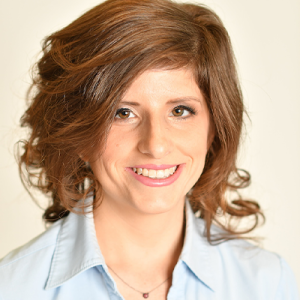
Related Articles
